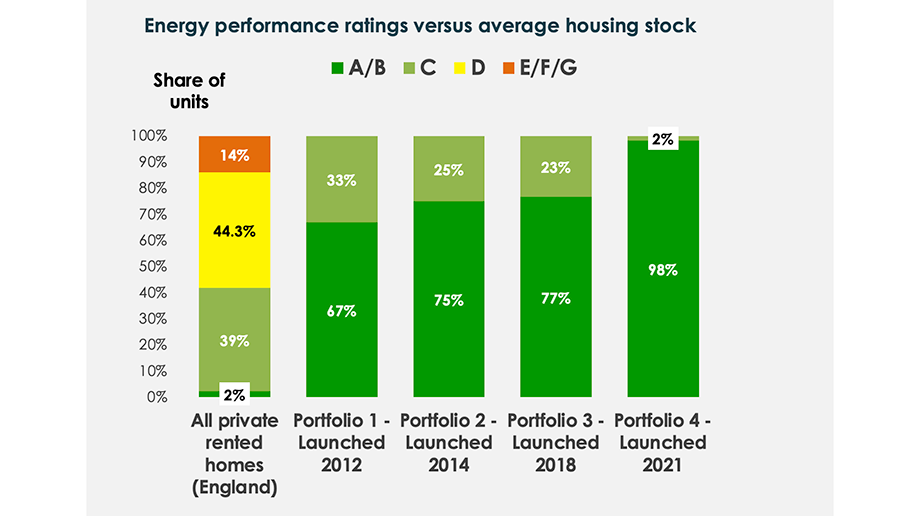Sue Robb of 4Children talks to Julie Laughton and Alison Britton from the Department for Education about the role of childminders in delivering the 30 hours free entitlement.
Categories
How new affordable private rented homes improve the energy efficiency of UK housing

With headlines lamenting the energy inefficiency of UK housing stock it is easy to be disheartened by the challenges of decarbonising our housing stock.
However, there has been real progress in recent years. One contribution is from institutional investors such as local government pension schemes, who are increasingly funding new, affordable and energy efficient private rented housing. With roughly one in five households renting privately, this segment plays an important part in the decarbonisation of overall UK housing stock.
Historically, most private rented homes were owned by small landlords. However, over the past decade larger professional investors have allocated over £60bn to the sector (Source: Investment Property Forum), with the rate of growth accelerating. Analysis by Savills for the British Property Federation showed that the build to rent sector accounted for over 240,000 new homes completed or in the pipeline by the end of 2022.
Hearthstone Investments is one specialist residential investment manager, acting mainly for local government pension schemes. The company has operated for over a decade and manages over 1,800 houses and flats in low rise apartment blocks across the UK. These are let to residents on average UK incomes, one in five of whom are key workers.
Hearthstone launched funds in 2012, 2014, 2018 and 2021. Analysing the EPC ratings of these four “vintages” shows successive improvements in energy efficiency, as tighter building standards have had a positive impact. The first fund, launched in 2012, currently has 67% of units EPC A or B rated, compared with 98% for the fund launched in 2021. Critically, all portfolios are much more energy efficient than the comparable UK average for private rented homes, of only 2%. This is important for reducing carbon emissions. On average, each home saves 4.7 tonnes of CO2 compared with the national average.
All eyes are now on the Future Homes Standard, which requires new homes to reduce carbon emissions by 75-80% from 2025, effectively precluding fossil fuels as their energy source. House builders are already preparing for this transition.
As the experience over the past decade demonstrates, a combination of more energy efficient building regulation and institutional investment can have a demonstrable positive impact in reducing carbon emissions.
Company Focus
Located in Bromley, Japanese Knotweed Eradication Ltd has been providing solutions in the treatment and removal of Japanese Knotweed (Fallopia Japonica) for over a decade. During this time we have mastered a repertoire of methods, from herbicidal treatments to landscaping solutions, tailored to address the unique challenges our clients face with this pervasive weed.
Event Diary
UKREiiF has quickly become a must-attend in the industry calendar for Government departments and local authorities.
The multi-award-winning UK Construction Week (UKCW), is the UK’s biggest trade event for the built environment that connects the whole supply chain to be the catalyst for growth and positive change in the industry.
Supplier Profiles
Geo Energy
At GeoEnergy Design, we're on a mission to disrupt the traditional way heating and cooling ha
Latest Features
Professor Harith Alani, director of the Knowledge Management Institute at the Open University explains how AI can be used for good and bad.
Alex Lawrence, head of health & social care, techUK sets out techUK’s Five Point Plan for CareTech.












